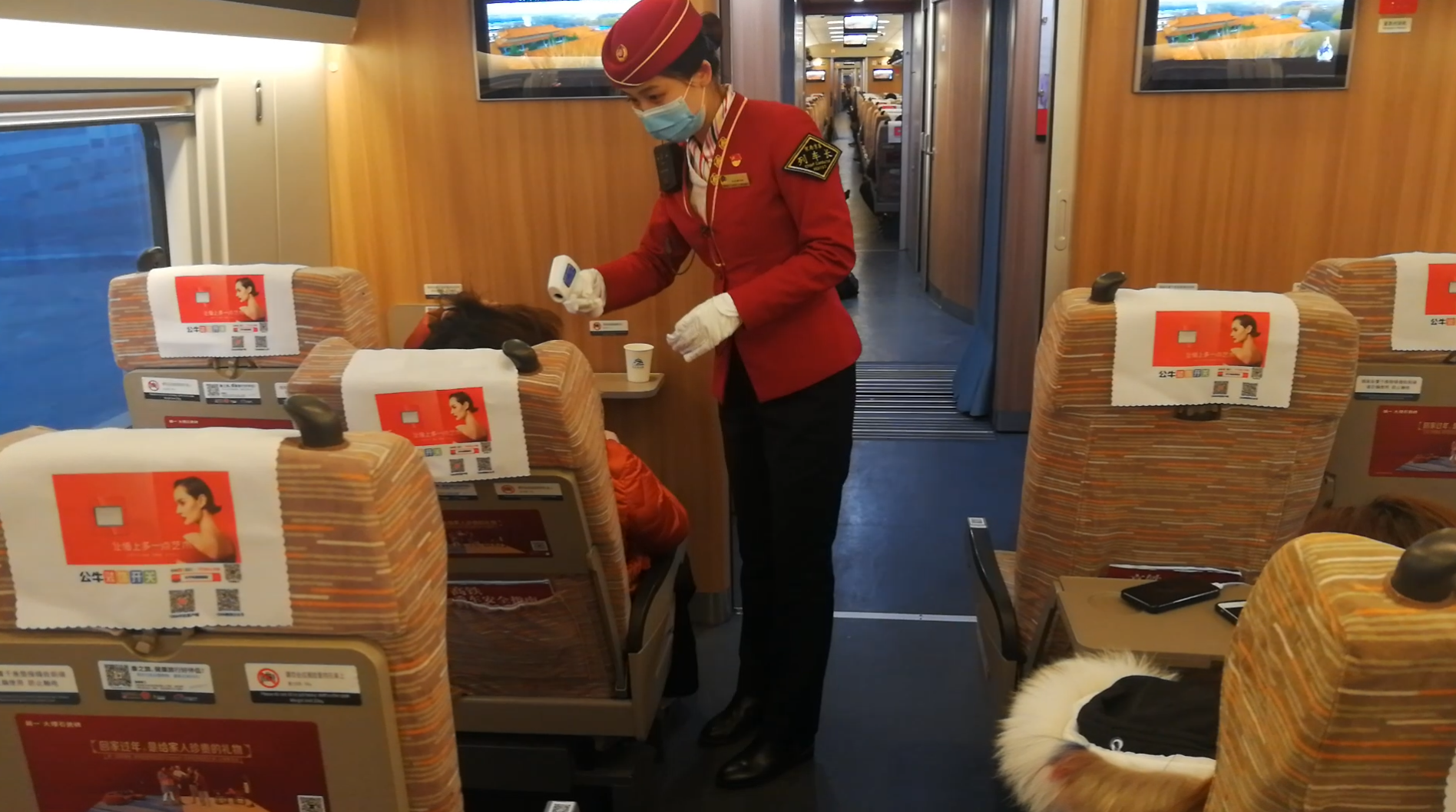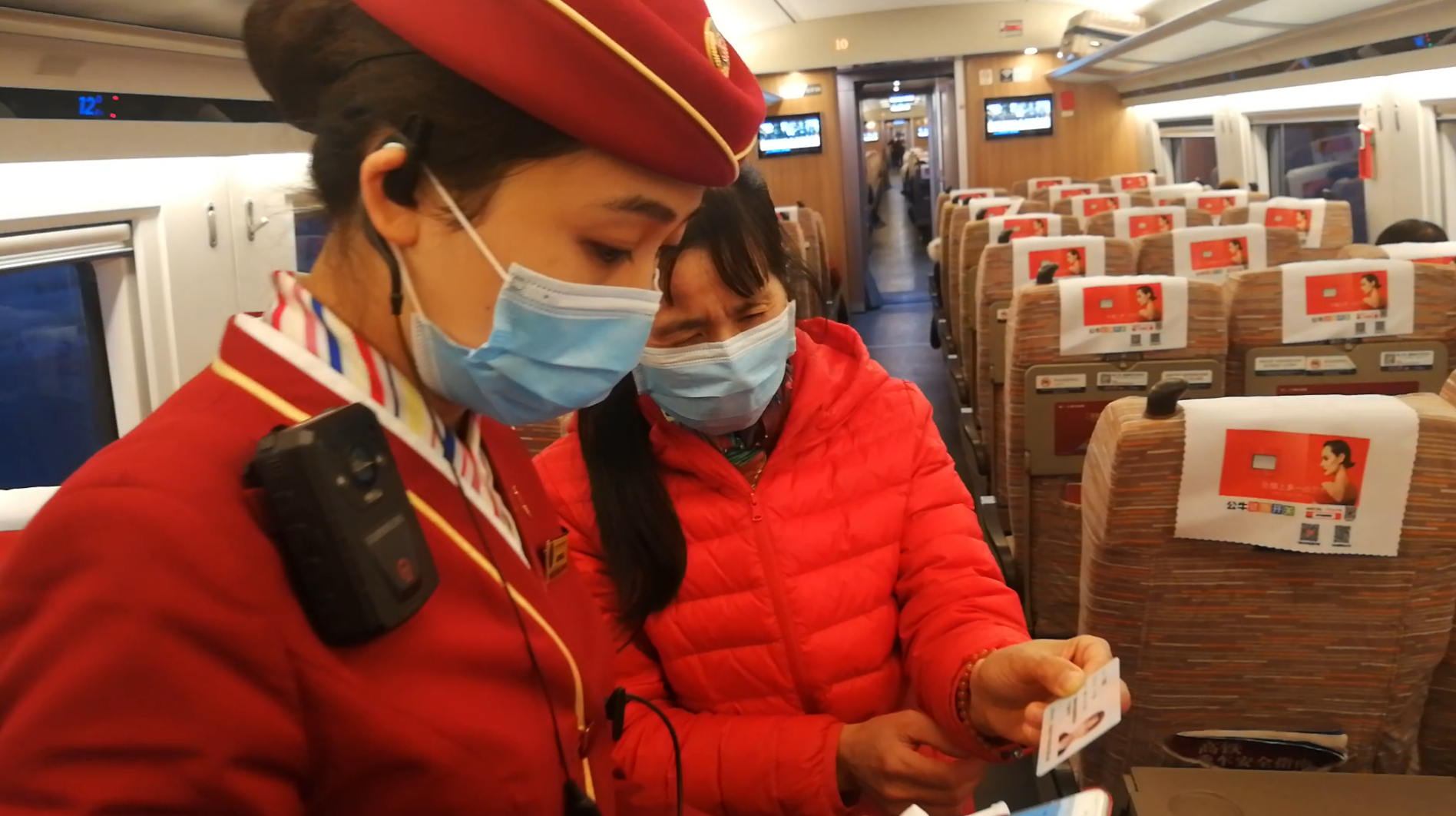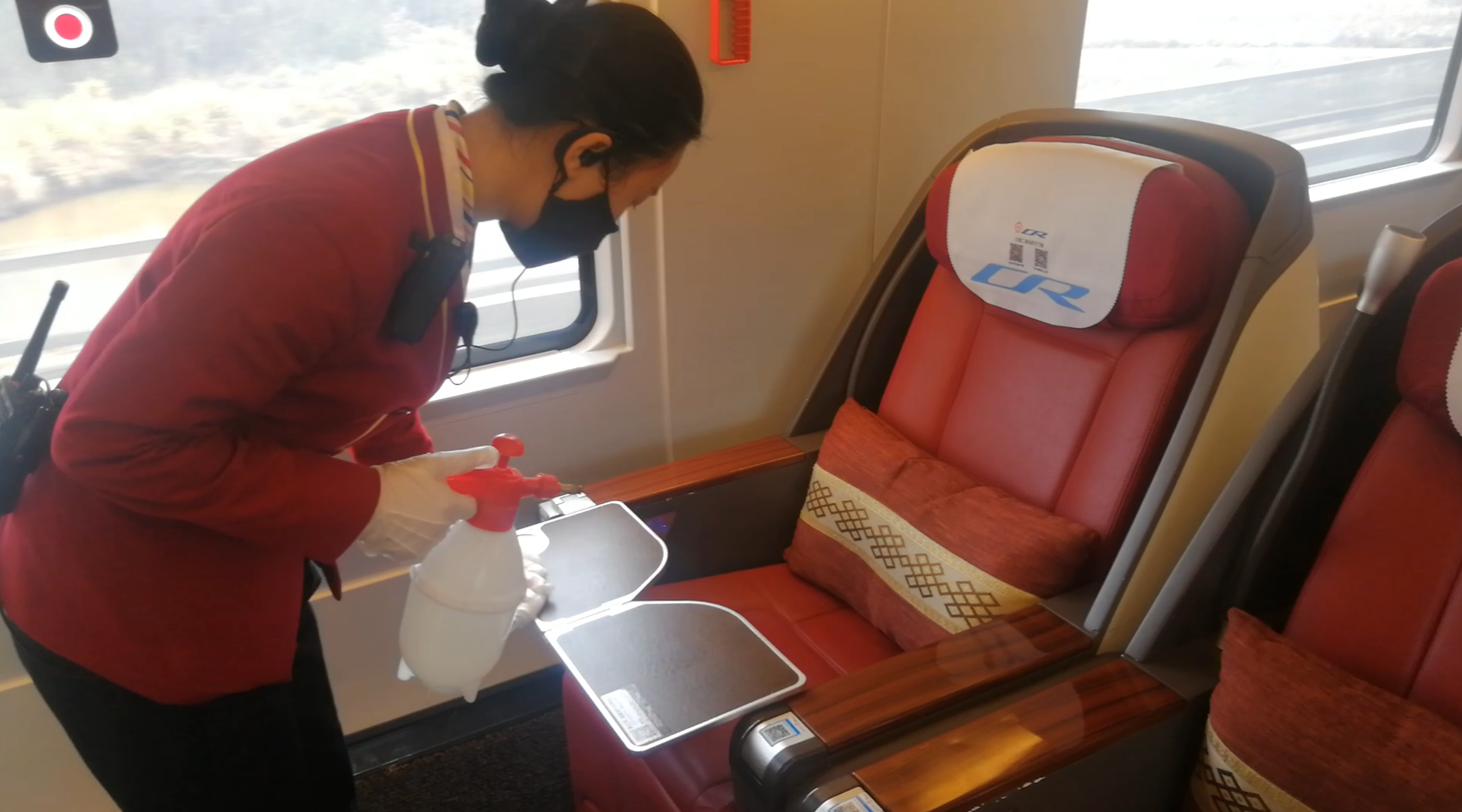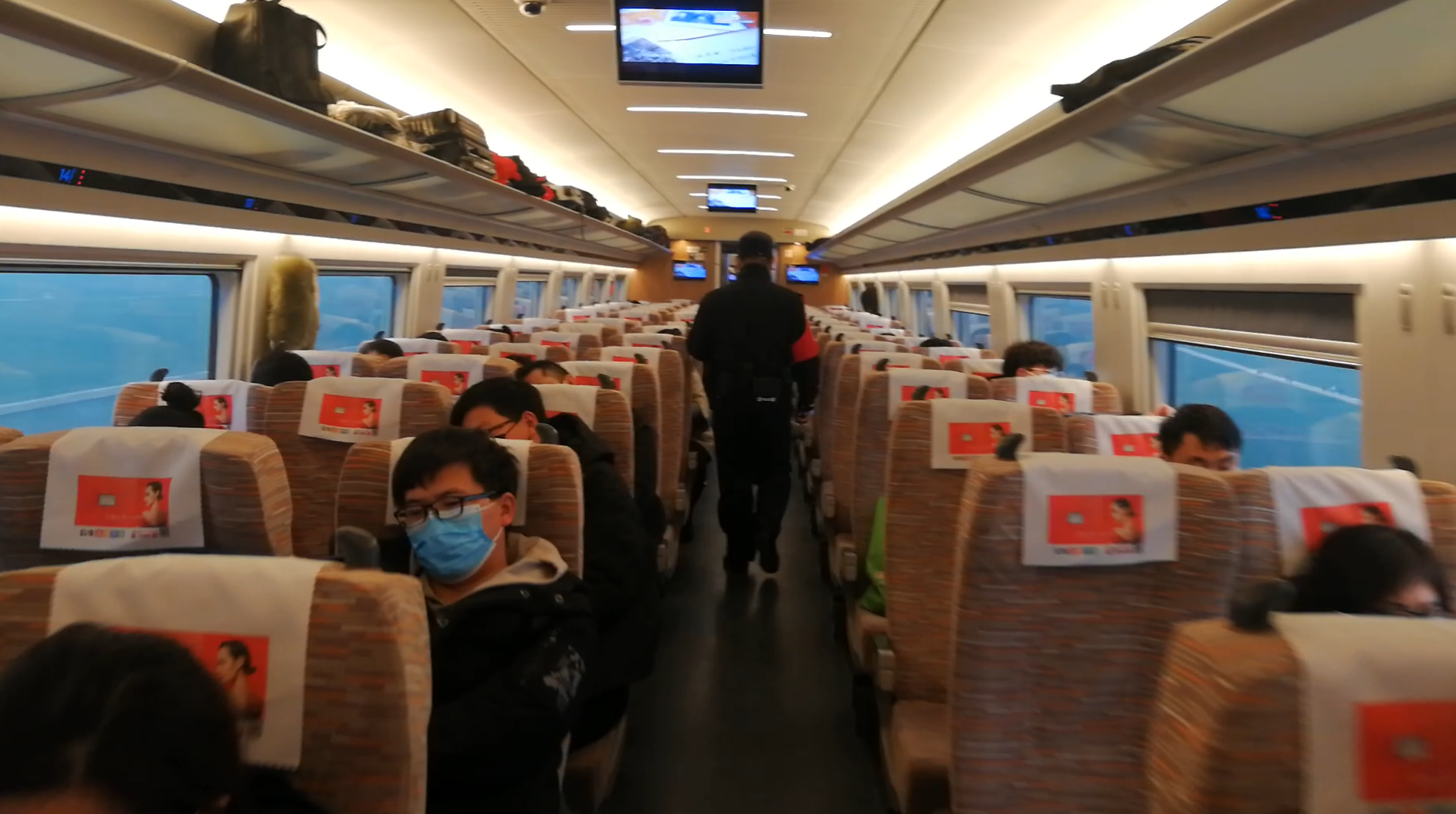03:19

Editor's note:
This is the tenth episode of our series "Faces Fighting Coronavirus" chronicling people from different walks of life who are affected by the outbreak as well as those who are trying to keep their lives as normal as they can to keep our society running. Here you can find the first, second, third, fourth, fifth, sixth, seventh, eighth, and ninth stories.
Our tenth episode looks at the life of a young high-speed train conductor. While most people canceled their travel plan as the coronavirus hit, she is still on the road.
Every year during China's Lunar New Year holiday travel rush, Wang Zhiqi, a conductor on high-speed trains, sees faces of excitement. After one year of hard work, people from across the country travel back to their hometowns for once-a-year family reunions.
But this year, she saw faces of anxiety and fear. The railway line Wang work is Beijing-Guangzhou high-speed railway that connects the Chinese capital and the provincial capital of southern Guangdong Province, with stops at regions worst hit by the novel coronavirus outbreak, including central Hubei Province and its capital Wuhan, the outbreak's epicenter.
On January 19, before she was aware of the outbreak, she noticed that some passengers were wearing masks. Four days later, Wuhan was sealed off, with all trains arriving and departing from the city suspended. And passengers are not allowed to get on or get off trains passing the locked down city.

Wang Zhiqi checks passengers' body temperatures as the train is about to arrive in its final destination. /Photo courtesy of Wang
Wang Zhiqi checks passengers' body temperatures as the train is about to arrive in its final destination. /Photo courtesy of Wang
"I remembered seeing a passenger wearing four masks, one over another, when he got on the train. Some were wearing protective clothes," Wang recalled. One passenger was found of a higher body temperature, not from a fever, but for the multiple layers of masks.
Her initial encounter with suspected cases of coronavirus was nerve-wrecking, though she hardly appeared so.
On January 25, two days after the city of Wuhan was quarantined, Wang worked in a 12-hour train ride from Beijing to Beihai in southern Guangxi Zhuang Autonomous Region. After a woman reported to her, Wang checked the woman's son and confirmed the boy's running a fever. He was at once quarantined.
She could sense the nervousness in the air. People were standing at the back trying to read the boy's temperature while a few came up and asked if anything went wrong. Her 10-year experience working on the railway gave her a gut instinct to reassure the feelings of those around. She directed the rest of the passengers to the nearby carriage and tried to put down the contact information of the feverish boy and his family members.

Wang Zhiqi verifies passengers' ID card on the train. /Photo courtesy of Wang
Wang Zhiqi verifies passengers' ID card on the train. /Photo courtesy of Wang
But the mother of the boy was fidgeting, Wang observed. As Wang was asking her ID number and address, the mother became uncooperative, and kept asking if they were going to be locked up once they got off the train. Amid the tension, Wang reassured her again and again that quarantine officials would wait for them at the next station of the ride and take them to the hospital immediately to get them screened.
To passengers on board, crew members like Wang are the soothing voices in times of anxiety, and they are the ones that can be counted on to deal with emergency situation, like when cases of suspected coronavirus infection are reported on the train.
But Wang said she also had her moments of doubts and anxiety. After seeing off the family, she kept thinking that she had to keep in touch with the mother to hear the testing result. It was only until the next day that she was told the boy had been cleared of COVID-19 infection.
"I remembered clearly that the moment I heard the news, I felt so happy…I told my colleagues the news and reported it to my company. It felt relaxed."

A train attendant disinfects the seat on a high-speed train. /Photo courtesy of Wang
A train attendant disinfects the seat on a high-speed train. /Photo courtesy of Wang
As the coronavirus outbreak continued, the railway crew team was running massively short of staff. In early February, around 20 out of 200 staff could come back to Beijing because they were stranded in their hometown, or because they were under quarantine.
Wang said she once worked non-stop for two return trips, a 10-hour train ride from Beijing to Futian district of Shenzhen, another train ride from Futian to Guangzhou, followed by a third one from Guangzhou to Shenzhen. After a night of sleep, she hopped on another train for a return trip from Shenzhen to Beijing.
Train crew have to walk constantly up and down the train to check the situation – a crying baby needs some milk, an aging senior in need of a helping hand – Wang kept standing on her feet for ten more hours in the train ride and by the time she arrived, she could feel that tiredness engulf her.
But she said nothing of these to her family. Her fatigue, her anxiety, not even the news that a few crew members in Tianjin were diagnosed with coronavirus. But one time when she was at home, her mom, reading news of surging coronavirus cases, called her tentatively and asked, "how about you ask for a sick leave?"

Most passengers refrain from walking through the train carriage after the coronavirus hit. /Photo courtesy of Wang
Most passengers refrain from walking through the train carriage after the coronavirus hit. /Photo courtesy of Wang
To Wang, that has never been an option. Ten years into her career, she said she was used to managing difficult situations and staying on the road. Especially at a time when the team is facing staff shortage, she cannot leave her position. Her mom, knowing that she would not nudge, chose to let her go, and gave her a full bag of protective equipment before she left.
"For us who have been on the railway roads for years, if we want to stay as cautious as possible just like the rest of the society do, then we would never have been in this field in the first place," Wang said. She used to be disappointed at the fact that she had to go to work when the rest of her family were coming back home.
"But now I am completely used to this (irregular) lifestyle. Given that I have made the choice, I want to do it well," she said.
Video editor: Chen Haoxuan
Writer: Yu Jing
Cover image: Liu Shaozhen
Special thanks to Beijing Passenger Transport Department, China Railway Beijing Group